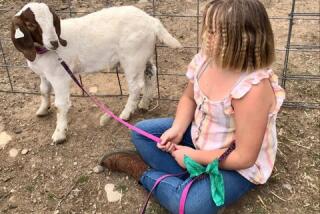The fur is flying in trend-setting Aspen over a measure to ban the sale of animal skins.
- Share via
ASPEN, Colo. — It’s Christmas, and the fur is flying here in more ways than one.
For years, glitzy, ritzy Aspen, the star-studded town of the $100 tip, where the average home sells for $1 million and where celebrities from Prince and Don Johnson to Barbara Walters and Jack Nicholson live and play, has been a swell place to wear a fur coat. The temperatures plunge below freezing and expensive clothes are more the rule than the exception.
Now it is also the town where the animal rights movement is making one of its more dramatic efforts.
In seven weeks, residents will cast their ballots on an initiative to ban the sale of skins from anything but domestic animals such as cattle and sheep. If it is approved, Aspen would be the first city in the nation, and possibly the world, to institute such a ban.
In some ways it seems like a pointless battle. There are only a handful of fur shops in town, and many of the furs literally fly in on the backs of tourists or second-home residents.
But since little Aspen (population 6,000) in 1986 was the first city in the nation to ban smoking in restaurants--a trend that mushroomed across the nation--both sides are pouring resources into the fights.
“The implications are pretty severe if this effort succeeds,” said Jack Neal, spokesman for the Fur Information Council of America.
“It’s like a pilot shot at the whole business,” said Cleveland Amory, president and founder of the Animal Rights Fund, the nation’s largest and oldest animal rights group. “For Aspen to do this is a landmark that might go to a lot of other places.”
Hundreds of letters, pro and con, have flooded the town’s two small daily newspapers from across the nation. Ads appear on television and in the newspapers. There are campaign mailings and buttons. Those opposed to the ban have even made it part of a campaign to recall the mayor and two city councilmen who support the ban.
On one side is the Aspen Society for Animal Rights, a coalition of citizens supported by the People for Ethical Treatment of Animals in Washington, D.C., and the Animal Rights Fund in New York City, as well as animal rights groups in Europe and Australia. They argue that the fur garments are a frivolous, greed-driven fashion fueled by the inhumane treatment of animals.
On the other side are the furriers, ranchers and folks who just like to wear fur, represented locally by the Aspen Concerned Citizens Coalition and backed financially by the Fur Information Council of America, a New York City-based trade association. They argue that today’s fur industry is a humane, highly regulated business in which 75% of the animals are ranched instead of trapped wild.
The issue first surfaced three years ago when Georgie Leighton, an eccentric French resident, led a successful crusade to ban the sale of fur from animals caught in tortuous leg-hold traps. Katherine Thalberg, local bookstore owner, longtime activist and daughter of famed 1920s and 1930s movie producer Irving G. Thalberg, has taken up the mantle.
Last spring, she and other activists began handing out anti-fur literature and holding rallies featuring prominent animal rights activists such as Amory and cartoonists Berke Breathed and William de Bok of Australia. Members would occasionally wear bloody furs in the town’s pedestrian mall.
Thalberg’s most important recruit, however, has been her husband, Bill Stirling, who also happens to be the town’s mayor. Stirling persuaded two of his four fellow council members to have the issue placed on the ballot for a Feb. 13 election.
The local pro-fur lobby retaliated by sending packages to members outlining form letters to be addressed to the mayor. The Fur Information Council of America, at their request, shipped in $3,000 for campaign ads and offered organizational support.
Mark Kirkland, president of the pro-fur lobby and manager of Revillion, an exclusive fur store, has led the battle against the initiative.
“The mayor’s trying to legislate his morality,” said Kirkland, who contended that “freedom of choice” would be “legislated away” if the measure passed.
Kirkland and others argue that while a ban obviously would be bad for local businesses that sell furs and fur-related products, it also would turn off those elite tourists who pour millions of dollars into the local economy.
“We have created the most expensive ski resort in the world, and people who patronize it are the people who wear fur,” he said. “The fur wearer comes in and leaves a $100 tip. What we’re saying to them (with this ordinance) is we don’t want you if you wear fur, and that is a very anti-Aspen attitude.”
A summer poll of attitudes toward the ban showed those in favor trailing by 36% to 47%. However, there is an underlying tension in the city toward affluent tourists that could make the vote closer than expected.
Longtime Aspen residents complain the vacationing elite have turned their once-unique mix of rich and ordinary residents into a gauche, yearly display of conspicuous consumption.
“It stands to reason that an issue that generates such rabid allegiance must have to do with more than how you feel about muskrats,” quipped Councilman Michael Glassman, an architect who opposes the ban.
More to Read
Sign up for Essential California
The most important California stories and recommendations in your inbox every morning.
You may occasionally receive promotional content from the Los Angeles Times.








